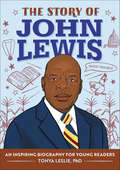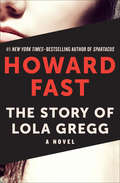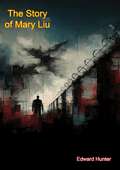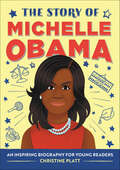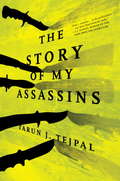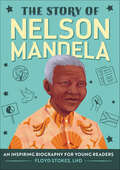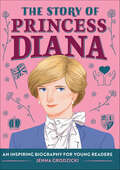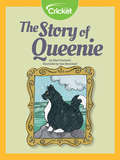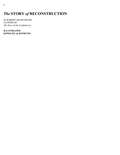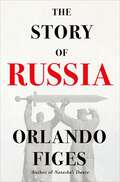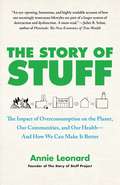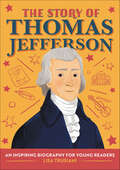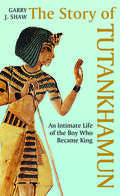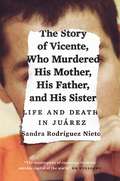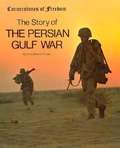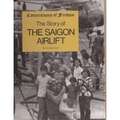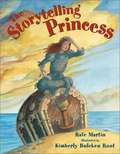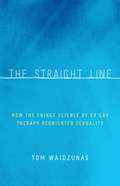- Table View
- List View
The Story of John Lewis: An Inspiring Biography for Young Readers (The Story of Biographies)
by Tonya LeslieDiscover the life of John Lewis—a story for kids 6 to 9 about fighting for a better world John Lewis was a civil rights leader and United States congressman who never stopped speaking up for justice, equality, and peace. Before he marched with Martin Luther King Jr. during the civil rights movement, John was a thoughtful kid who loved learning but wasn't able to go to a good school because of segregation. He wanted to make a difference in his community, so he organized peaceful protests to end segregation and fight for equal rights for Black Americans. Explore how John went from being a young farm boy to a famous activist, politician, and leader.Independent reading—This John Lewis biography is broken down into short chapters and simple language so kids 6 to 9 can read and learn on their own.Critical thinking—Kids will learn the Who, What, Where, When, Why, and How of John's life, find definitions of new words, discussion questions, and more.A lasting legacy—Find out how John made the world a more equal place for future generations in this Black history book for kids.How will John's hard work, bravery, and kindness inspire you?Discover activists, artists, and athletes, and more from all across history with the rest of The Story Of series, including famous figures like: Sojourner Truth, Martin Luther King Jr., Maya Angelou, Ruby Bridges, and Barack Obama.
The Story of Lola Gregg: A Novel
by Howard FastAs the sinister shadow of McCarthyism spreads across America, a woman fights to save everything she holds dearLola Gregg grew up the daughter of a respected physician in a tiny factory town. She married and had children, perfectly content in her quiet suburban existence. But Lola has a problem: At a time when progressivism is considered a national threat, Lola and her husband are on the wrong side of the political spectrum. When the FBI begins to tail her husband due to his leftist affiliations, Lola is forced to choose between her deeply held beliefs and the very safety of her family. Intense and thought-provoking, Lola Gregg is a potent thriller about one woman&’s struggle to preserve ideological freedom against the reactionary forces of her day. This ebook features an illustrated biography of Howard Fast including rare photos from the author&’s estate.
The Story of Mary Liu
by Edward Hunter"The Story of Mary Liu" by Edward Hunter is a poignant and powerful narrative that delves into the life of Mary Liu, a courageous woman who endured and resisted the harsh realities of communist China. Through her personal story, Hunter paints a vivid picture of the cultural and political turmoil that defined mid-20th century China.Mary Liu's journey is one of resilience and determination. Born into a world of political upheaval, she navigates the oppressive environment of Maoist China, where fear and suspicion permeate daily life. The book captures her struggles against the repressive regime, her fight for personal and religious freedom, and her ultimate quest for a life of dignity and truth.Hunter's meticulous research and compelling storytelling bring Mary Liu's experiences to life, offering readers an intimate look at the human side of history. Her story is a testament to the strength of the human spirit in the face of tyranny and the enduring hope for a better future."The Story of Mary Liu" is more than a biography; it is a lens through which readers can understand the broader socio-political landscape of communist China. It highlights the profound impact of political ideologies on individual lives and underscores the universal desire for freedom and justice.This book is a must-read for those interested in Chinese history, human rights, and the inspiring stories of individuals who stand against oppression. Edward Hunter's "The Story of Mary Liu" is a moving tribute to one woman's bravery and an enlightening exploration of a tumultuous period in world history.
The Story of Michelle Obama: An Inspiring Biography for Young Readers (The Story Of)
by Christine PlattDiscover the life of Michelle Obama—a story for kids ages 6 to 9 about working for changeMichelle Obama is one of the most important women in American history. Before she served as the first Black first lady of the United States, Michelle was a smart and studious kid who wanted to give back to her community. She became a lawyer so that she could help people understand the law and get the legal aid they needed. When she became first lady, she continued to help people—especially young people—in many ways. Explore how Michelle went from being a young girl growing up on the South Side of Chicago to an American role model and leader in the White House.Independent reading—This Michelle Obama biography is broken down into short chapters and simple language so kids 6 to 9 can read and learn on their own.Critical thinking—Kids will learn the Who, What, Where, When, Why, and How of Michelle's life, find definitions of new words, discussion questions, and more.A lasting legacy—Watch Michelle progress from young girl to American leader with a visual timeline of the major milestones of her life.How will Michelle's ambition, hard work, and kind heart inspire you?Discover activists, artists, and athletes, and more from all across history with the rest of The Story Of series, including famous figures like: Sojourner Truth, Martin Luther King Jr., John Lewis, Ruby Bridges, and Barack Obama.
The Story of My Assassins
by Tarun J. TejpalBased on actual events, The Story of My Assassins tells the story of a journalist who learns that the police have captured five hitmen on their way to kill him. Landing like a bombshell on his comfortable life, just as he's started a steamy affair with a brilliant woman, the news prompts him to launch an urgent investigation into the lives of his aspiring murderers--a ragtag group of street thugs and village waifs--and their mastermind. Who wanted him dead, and why? But the investigation forces him to reexamine his own life, too--to confront his own notion of himself, his job, and his treatment of the women in his life, as well as his own complex feelings about the country that crafted his would-be killers. Part thriller and part erotic romance, full of dark humor and knife-edged suspense, The Story of My Assassins is a piercing literary novel that takes us from the lavish, hedonistic palaces of India's elite to its seediest slums. It is a novel of corruption, passion, power, and ambition; of extreme poverty and obscene wealth. It is an awesome adventure into the heart of today's India.From the Hardcover edition.
The Story of Nelson Mandela: An Inspiring Biography for Young Readers (The Story of Biographies)
by Floyd StokesDiscover the life of Nelson Mandela—a story about uniting a country for kids ages 6 to 9Nelson Mandela was the first Black president of South Africa, and he dedicated his life to fighting for equal rights for all South Africans. Before he became a symbol of peace and justice around the world, Nelson was a thoughtful kid who loved to play outside and learn new things. Throughout his life, he used his voice to fight against apartheid and didn't back down even after spending 27 years in prison. Explore how Nelson went from being a young boy to a civil rights hero.Independent reading—This Nelson Mandela biography is broken down into short chapters and simple language so kids 6 to 9 can read and learn on their own.Critical thinking—Kids will learn the Who, What, Where, When, Why, and How of Nelson's life, find definitions of new words, discussion questions, and more.A lasting legacy—Watch Nelson progress from kid to president of South Africa with a visual timeline marking the major milestones of his life.How will Nelson's strength inspire you?Discover activists, artists, and athletes, and more from all across history with the rest of The Story Of series, including famous figures like: Sojourner Truth, Martin Luther King Jr., John Lewis, Ruby Bridges, and Barack Obama.
The Story of Princess Diana: An Inspiring Biography for Young Readers (The Story Of)
by Jenna GrodzickiDiscover the life of Princess Diana—a story about helping those in need for kids ages 6 to 9Princess Diana was known as the "People's Princess" because she loved to be kind and generous to others. Before she made a big impact on the world, Diana was a thoughtful little girl who loved animals and ballet. Her life changed when she became royalty, but she never gave up her passion for helping people. Explore how Diana went from being a little girl growing up in England to one of the most famous women in the world, known especially for her compassion.Independent reading—This Princess Diana biography is broken down into short chapters and simple language so kids 6 to 9 can read and learn on their own.Critical thinking—Kids will learn the Who, What, Where, When, Why, and How of Diana's life, find definitions of new words, discussion questions, and more. A lasting legacy—Discover how Diana helped change the world for future generations, including you!How will Princess Diana's big heart inspire you?Discover activists, artists, athletes, and more from across history with the rest of the Story Of series, including famous figures like: Marie Curie, Selena Quintanilla, Frida Kahlo, Helen Keller, and Jane Goodall.
The Story of Queenie
by Jerry MillerLilibet is a royal Maine Coon. After escaping the French Revolution with her siblings, they travel to Maine in order to find a new home. Soon after arriving and settling into their new homes, Lilibet realizes she is not happy. She decides to go North in search of a new home. Instead, she finds the ocean and a painter. Will she find an owner who treats her like a queen?
The Story of Reconstruction
by Robert Selph HenryThe Reconstruction is one of the most complex and fascinating chapters in American history. Initially driven by a just repugnance to the institution of slavery, it promised a new era of human rights and a new dispensation for the dispossessed. But it soon became tainted by corruption, vindictiveness and greed, and ultimately failed in its nobler aims. The author undertakes to put together in one continuous thread of story, the key events of the period in each of the southern states.
The Story of Russia
by Orlando Figes“This is the essential backstory, the history book that you need if you want to understand modern Russia and its wars with Ukraine, with its neighbors, with America, and with the West.”—Anne Applebaum, author of Twilight of Democracy and Red Famine Named a Most Anticipated Book of the Year by Publishers Weekly and Kirkus ReviewsFrom “the great storyteller of Russian history” (Financial Times), a brilliant account of the national mythologies and imperial ideologies that have shaped Russia’s past and politics—essential reading for understanding the country todayThe Story of Russia is a fresh approach to the thousand years of Russia’s history, concerned as much with the ideas that have shaped how Russians think about their past as it is with the events and personalities comprising it. No other country has reimagined its own story so often, in a perpetual effort to stay in step with the shifts of ruling ideologies. From the founding of Kievan Rus in the first millennium to Putin’s war against Ukraine, Orlando Figes explores the ideas that have guided Russia’s actions throughout its long and troubled existence. Whether he's describing the crowning of Ivan the Terrible in a candlelit cathedral or the dramatic upheaval of the peasant revolution, he reveals the impulses, often unappreciated or misunderstood by foreigners, that have driven Russian history: the medieval myth of Mother Russia’s holy mission to the world; the imperial tendency toward autocratic rule; the popular belief in a paternal tsar dispensing truth and justice; the cult of sacrifice rooted in the idea of the “Russian soul”; and always, the nationalist myth of Russia’s unjust treatment by the West.How the Russians came to tell their story and to revise it so often as they went along is not only a vital aspect of their history; it is also our best means of understanding how the country thinks and acts today. Based on a lifetime of scholarship and enthrallingly written, The Story of Russia is quintessential Figes: sweeping, revelatory, and masterful.
The Story of Stuff: How Our Obsession with Stuff Is Trashing the Planet, Our Communities, and Our Health-and a Vision for Change
by Annie LeonardA classic exposé in company with An Inconvenient Truth and Silent Spring, The Story of Stuff expands on the celebrated documentary exploring the threat of overconsumption on the environment, economy, and our health. Leonard examines the &“stuff&” we use everyday, offering a galvanizing critique and steps for a changed planet.The Story of Stuff was received with widespread enthusiasm in hardcover, by everyone from Stephen Colbert to Tavis Smiley to George Stephanopolous on Good Morning America, as well as far-reaching print and blog coverage. Uncovering and communicating a critically important idea—that there is an intentional system behind our patterns of consumption and disposal—Annie Leonard transforms how we think about our lives and our relationship to the planet. From sneaking into factories and dumps around the world to visiting textile workers in Haiti and children mining coltan for cell phones in the Congo, Leonard, named one of Time magazine’s 100 environmental heroes of 2009, highlights each step of the materials economy and its actual effect on the earth and the people who live near sites like these. With curiosity, compassion, and humor, Leonard shares concrete steps for taking action at the individual and political level that will bring about sustainability, community health, and economic justice. Embraced by teachers, parents, churches, community centers, activists, and everyday readers, The Story of Stuff will be a long-lived classic.
The Story of Thomas Jefferson: An Inspiring Biography for Young Readers (The Story of Biographies)
by Lisa TrusianiDiscover the life of Thomas Jefferson—a story about big ideas and building a nation for kids ages 6 to 9Thomas Jefferson helped write the Declaration of Independence and became the third president of the United States. Before he helped create America, Thomas was a young boy who loved to play outside, read, and think about new ways of doing things. He studied law and came up with revolutionary ideas that helped build a new country.Explore how Thomas went from being a curious kid growing up in Virginia to one of America's most important founding fathers.Independent reading—This Thomas Jefferson biography is broken down into short chapters and simple language so kids 6 to 9 can read and learn on their own.Critical thinking—Kids will learn the Who, What, Where, When, Why, and How of Thomas's life, find definitions of new words, discussion questions, and more.A lasting legacy—See Thomas Jefferson progress from a curious young boy to a founding father and president of the United States.How will Thomas's bright ideas inspire you?Discover activists, artists, athletes, and more from all across history with the rest of The Story Of series, including famous figures like: George Washington, Abraham Lincoln, Barack Obama, Joe Biden, and Kamala Harris.
The Story of Tutankhamun: An Intimate Life of the Boy who Became King
by Garry J. ShawA lively new biography of Tutankhamun—published for the hundredth anniversary of his tomb&’s modern discovery The discovery of Tutankhamun&’s tomb in 1922 sparked imaginations across the globe. While Howard Carter emptied its treasures, Tut-mania gripped the world—and in many ways, never left. But who was the &“boy king,&” and what was his life really like? Garry J. Shaw tells the full story of Tutankhamun&’s reign and his modern rediscovery. As pharaoh, Tutankhamun had to manage an empire, navigate influential courtiers, and suffer the pain of losing at least two children—all before his nineteenth birthday. Shaw explores the boy king&’s treasures and possessions, from a lock of his grandmother&’s hair to a reed cut with his own hands. He looks too at Ankhesenamun, Tutankhamun&’s wife, and the power queens held. This is a compelling new biography that weaves together intriguing details about ancient Egyptian culture, its beliefs, and its place in the wider world.
The Story of Vicente, Who Murdered His Mother, His Father, and His Sister
by Daniela Maria Ugaz John Washington Sandra NietoThe intimate story of a teenager's murder of his family, from an award-winning Mexican journalist Sixteen-year-old Vicente and two of his high school friends murdered his mother, his father, and his little sister in cold blood. Through a Capote-like reconstruction of this seemingly inexplicable triple murder, Sandra Rodríguez Nieto paints a haunting and unforgettable portrait of the most violent city on Earth, with an in-depth investigation into the thought process of the three boys, the city of Juárez and the drug cartels that wage war in its streets.This book explores how poverty, political corruption, incapacitated government institutions and US meddling combined to create the explosion of violence in Juárez. The product of years of tenacious reporting that have brought Sandra Rodríguez Nieto international acclaim, this book traces the rise of a national culture of extreme violence, and is a testament to the extraordinary bravery of a reporter.From the Hardcover edition.
The Story of World War I
by John MalamWorld War I was the world's first "total war." Although large-scale wars like the Napoleonic wars had ranged across many territories, the scale of the World War I was unprecedented. It was also the first war between modern, industrialized nations and mechanized warfare saw new and terrifying weapons deployed for the first time, including airplanes, tanks, zeppelins, giant warships, and poison gas. Now, on the verge of the centenary of the start of World War I, this fact-packed information book relates the unfolding events and the human stories in a way that brings history vividly to life.
The Story of the Election of Abraham Lincoln (Cornerstones of Freedom)
by Zachary KentFollows Abraham Lincoln's political career from his senatorial campaigning in Illinois to his early actions as president, discussing his political opponents and the state of the American government at that time.
The Story of the Great Society (Cornerstones of Freedom)
by Leila Merrell FosterDescribes the social reform work done by President Johnson and the significant legislative accomplishments through which he hoped to help blacks and the poor of America.
The Story of the Irish People
by Sean O'FaolainSean O'Faolain, a distinguished Irish novelist and short story writer, has written a terse, luminous inquiry into Ireland and the Irishman. "This book," writes O'Faolain, "is not a history of political events, although some political events are described briefly in the course of the main narrative. It is, in effect, a creative history of the growth of the racial mind; or, if the term were not too large and grandiose, the story of the development of a national civilization..." This modest description of the author's purpose does not indicate that The Story of the Irish People is unusually good history and unusually good reading. The Story of the Irish People presents and explains the historic influences that have molded the character of the Irish down through the centuries. In agreement with Arnold Toynbee's view of history as a series of challenges and responses, and with R. G. Collingwood's statement, "History proper is the history of thought; there are no mere events in history," O'Faolain ranges the fields of political and religious history, economic and artistic development, mythology, literature, and social structure. He does much to clarify the contradictions of Irish character and history that have so long puzzled historians and biographers. O'Faolain contends that contemporary Irish traits and values are largely the results of a series of invasions dating from prehistory. He shows that each of these invasions in turn made its distinct contributions. The Celts brought their mythology, the Romans Christianity, the Danes built the towns, the Normans erected the abbeys and the castles, and the English brought their language and their law. Irish characteristics are epitomized in Ireland's rebels, writers, and clergy, all of whom receive a penetrating analysis. As a preliminary to the study of Irish literature, to research in Irish history, or simply as an introduction to the people "whose wars are always merry and whose songs are always sad," this book, by one of Ireland's leading writers, is helpful, informative, and highly interesting.
The Story of the Montgomery Bus Boycott (Cornerstones of Freedom)
by R. Conrad SteinTraces the events in the Montgomery, Alabama, bus boycott which began in December, 1955, and changed the course of the civil rights movement.
The Story of the Nineteenth Amendment (Cornerstones of Freedom)
by R. Conrad SteinA history of the movement to grant women the right to vote in the United States, which culminated in the nineteenth amendment to the Constitution in 1920 that permitted them to do so.
The Story of the Persian Gulf War (Cornerstones of Freedom)
by Leila Merrell FosterExamines the causes and events of the Persian Gulf War that followed Iraq's invasion of Kuwait in 1990.
The Story of the Powers of the President (Cornerstones of Freedom)
by R. Conrad SteinDescribes the special powers invested in the presidential office and discusses the use of these powers by individual presidents throughout United States' history.
The Story of the Saigon Airlift (Cornerstones of Freedom)
by Zachary KentDescribes that dramatic helicopter airlift, the largest in history, which during two days in 1975 carried thousands of Americans and selected South Vietnamese out of Saigon as the North Vietnamese marched to capture the city, thus ending the long Vietnam War.
The Storytelling Princess
by Rafe MartinHer parents thought she would marry the prince they had picked out. But this princess definitely had other ideas. This is a book filled with high adventure, disguises, a princess lost at sea, and a surprise ending that sets everything right.
The Straight Line: How the Fringe Science of Ex-Gay Therapy Reoriented Sexuality
by Tom WaidzunasTo be taken seriously, therapies that claim to &“cure&” homosexuality wrap themselves in lab coats. Even though the fit is bad, and such therapies and their theorists now inhabit the scientific fringe, the science of sexuality has made some adjustments, too, Tom Waidzunas tells us in this provocative work. Intervening in the politics of sexuality and science, The Straight Line argues that scientific definitions of sexual orientation do not merely reflect the results of investigations into human nature, but rather emerge through a process of social negotiation between opposing groups. The demedicalization of homosexuality and the discrediting of reparative therapies, ex-gay ministries, and reorientation research have, Waidzunas contends, required scientists to enforce key boundaries around scientific expertise and research methods. Drawing on extensive participant observation at conferences for ex-gays, reorientation therapists, mainstream psychologists, and survivors of ex-gay therapy, as well as interviews with experts and activists, The Straight Line traces reorientation debates in the United States from the 1950s to the present, following homosexuality therapies from the mainstream to the margins. As the ex-gay movement has become increasingly transnational in recent years, Waidzunas turns to Uganda, where ideas about the scientific nature of homosexuality influenced the passage of the Anti-Homosexuality Act of 2014. While most studies treat the ex-gay movement as a religious phenomenon, this book looks at how the movement, in its attempts to establish legitimacy, has engaged with scientific institutions, shaping virulent anti-gay public policy.
